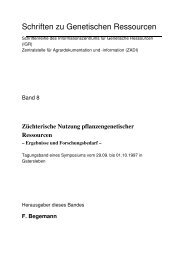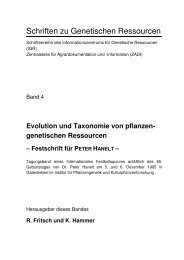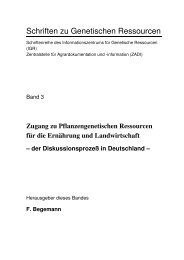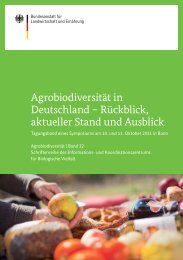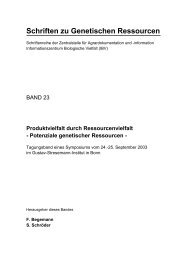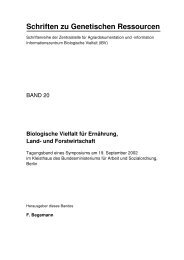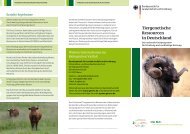Integration of Conservation Strategies of Plant Genetic ... - Genres
Integration of Conservation Strategies of Plant Genetic ... - Genres
Integration of Conservation Strategies of Plant Genetic ... - Genres
You also want an ePaper? Increase the reach of your titles
YUMPU automatically turns print PDFs into web optimized ePapers that Google loves.
European Cooperation on <strong>Plant</strong> <strong>Genetic</strong> Resources:<br />
Towards Phase V <strong>of</strong> ECP/GR<br />
E.A. FRISON, M. BOLTON 1<br />
The European Cooperative Programme for Crop <strong>Genetic</strong> Resources Networks (ECP/GR) is a<br />
pan-European collaborative programme with the aim <strong>of</strong> fostering coordinated activities in the<br />
plant genetic resources field; at the end <strong>of</strong> 1992 28 countries were participating. The Programme<br />
grew out <strong>of</strong> the 1975 Helsinki conference on Security and Cooperation in Europe and began<br />
operating in 1980 as a regional joint UNDP/FAO project with the name "European Cooperative<br />
Programme for the <strong>Conservation</strong> and Exchange <strong>of</strong> Crop <strong>Genetic</strong> Resources". Under Phase II <strong>of</strong><br />
the Programme, which began in 1983, coordination was provided by IBPGR, as a special project,<br />
and this coordinating role continued throughout the subsequent phases III and IV, with the costs<br />
<strong>of</strong> the Programme being borne entirely by participating countries.<br />
At the end <strong>of</strong> Phase I an evaluation mission recommended that the programme be organised<br />
around a number <strong>of</strong> crop-specific working groups, with members selected for their expertise in<br />
the particular species. Consequently groups were established for the following crops: Allium,<br />
Avena, barley, forages, Prunus and sunflower. At the end <strong>of</strong> the second and third phases a<br />
number <strong>of</strong> other crops were considered for inclusion in the programme. Beet, Brassica, Pisum<br />
and Vitis were recommended for ad hoc action during Phase III and the implementation <strong>of</strong><br />
working groups for Brassica, Pisum and Vitis was recommended for Phase IV, an international<br />
network for Beta having already been established outside the framework <strong>of</strong> the ECP/GR.<br />
Phase IV, which began in 1990, was primarily a continuation <strong>of</strong> previous work, based on<br />
workplans elaborated in Phase III. During the phase two <strong>of</strong> the 24 crop-specific databases<br />
created through the ECP/GR were transferred to new hosts: the Prunus database from the Nordic<br />
Genebank to INRA, Bordeaux, and the cultivated Brassica database from IHAR, Poland to CGN,<br />
Wageningen. The successful conclusion <strong>of</strong> both moves is an illustration <strong>of</strong> the high level <strong>of</strong><br />
cooperation achieved within the ECP/GR. All the working groups were able to meet once; in<br />
addition a new working group was established for Brassica and contacts have been made to<br />
initiate a Pisum working group in early 1994. Phase IV was formally concluded at the end <strong>of</strong><br />
1992 but many parties, including all the working groups, had stressed the need for a continued<br />
coordination mechanism and consideration was therefore given to implementing a fifth phase.<br />
Among the achievements <strong>of</strong> the ECP/GR to date are the following:<br />
- European Databases<br />
1<br />
Authors' address:<br />
International Board for <strong>Plant</strong> <strong>Genetic</strong> Resources<br />
Via delle Sette Chiese 142<br />
00145 Rome<br />
Italy



